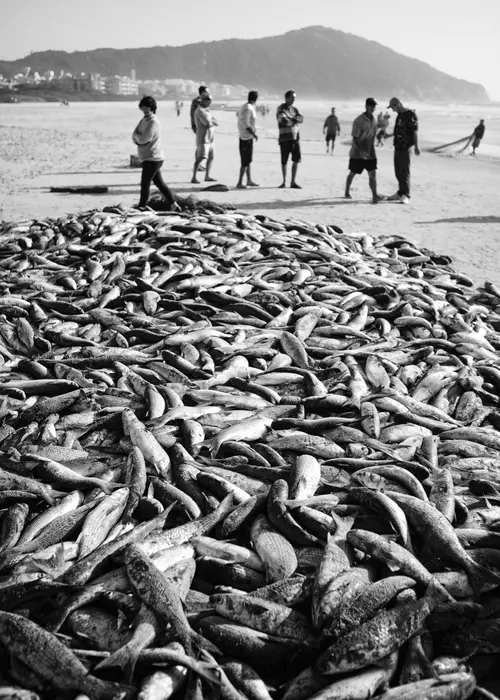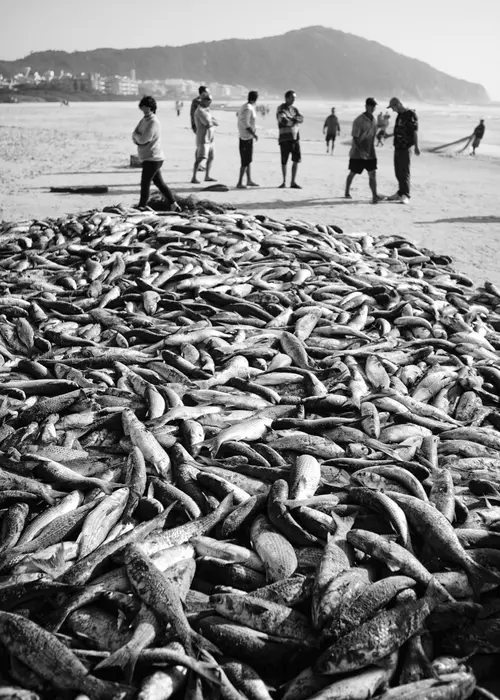Humans have depended on marine ecosystems as a source of food and livelihood for thousands of years along the Brazilian coast. Over the past few decades, increased fishing demands, cycles of profit-driven subsidy programs, and weak governance models have intensified commercial exploitation, leading to unprecedented catch levels and the decline of a number of stocks. Regrettably, the scale of these impacts remains unclear due to a pervasive lack of historical baselines.

Credit: Crèdits: Eduardo Cassol – Livro Nossa Pesca
Humans have depended on marine ecosystems as a source of food and livelihood for thousands of years along the Brazilian coast. Over the past few decades, increased fishing demands, cycles of profit-driven subsidy programs, and weak governance models have intensified commercial exploitation, leading to unprecedented catch levels and the decline of a number of stocks. Regrettably, the scale of these impacts remains unclear due to a pervasive lack of historical baselines.
A study carried out in Brazil, and published in PlosOne, shows how scientists are making strides in our understanding of marine biodiversity over the past few hundred years. The study, led by scientists of the Institute of Environmental Science and Technology at the Universitat Autònoma de Barcelona (ICTA-UAB) in Spain, examined over 20,000 newspaper articles published between 1840 and 2019 in the state of Santa Catarina (Brazil). They found that more than 250 species, including fish, sharks, shellfish, and mammals, were commercially exploited in the past 180 years.
The study also shows that species at the highest level of the food chain, including groupers and sharks, were commonly reported in newspapers between the late 19th and mid-20th century. Intriguingly, these species became less frequent in more recent newspapers, while low trophic level organisms, such as mollusks and crustaceans, increased.
Dannieli Herbst, leading author from ICTA-UAB and the UAB Department of Prehistory, highlights that “marine species were usually reported in the context of subsistence and commercial fisheries. This implies that their popularity in newspapers reflects their abundance and importance to commercial fisheries and consumers. Consequently, the results reveal that high trophic level and large-bodied species were more abundant in the past but became rare in recent decades. Our results agree with previous studies showing a similar trend in recent decades due to overfishing.”
André Colonese, senior author of the study from ICTA-UAB and the UAB Department of Prehistory, emphasizes the importance of this study because “it predates official national landing reports and the results hint at changes in the ecological, socio-cultural, economic, and market importance of aquatic animals over time. Our work expands the current knowledge on historical fish catch compositions in the southwestern Atlantic Ocean, while advocating for the integration of historical data in ocean sustainability initiatives.”
“It is astonishing how much information on species diversity and consumer perception of changes can be extracted from public media such as newspapers”, said Luiz Geraldo S. Da Silva, historian from the Universidade Federal do Paraná (Brazil) and co-author of the study.
The study was funded by the ERC project TRADITION (Consolidator Grant 817911) and was led by researchers at the UAB (Spain), in collaboration with the Universidade Federal de Santa Catarina (Brazil) and Universidade Federal do Paraná (Brazil).
Journal
PLoS ONE
DOI
10.1371/journal.pone.0284024
Method of Research
Literature review
Subject of Research
Not applicable
Article Title
180 years of marine animal diversity as perceived by public media in southern Brazil
Article Publication Date
29-Jun-2023





